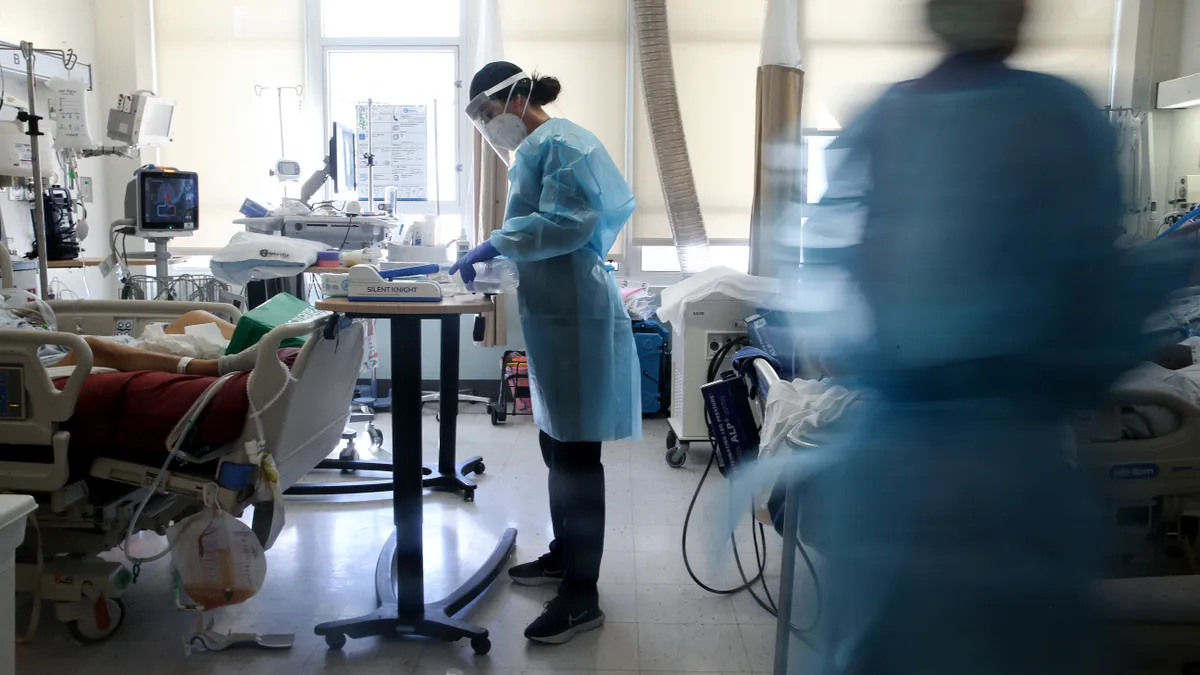Dive Brief:
- The CMS is planning to hike inpatient hospital payments by 3.2% for fiscal year 2023, an increase of $1.6 billion, according to the Inpatient Prospective Payment System proposed rule released Monday.
- The American Hospital Association decried that increase as too low and "simply unacceptable" considering inflation and rising hospital labor costs. The group said its members "continue to face a range of challenges that threaten their ability to continue caring for patients and providing essential services for their communities."
- Analysts with J.P. Morgan wrote that the outlook for medtech companies is "largely unchanged" with the modest increase in payment rates, adding that, "Pricing in medical devices has historically not correlated with changes in CMS payment rates."
Dive Insight:
The increase in payment rates largely isn't expected to affect medical device companies, though analysts hoped it could stabilize pricing.
Analysts with Evercore ISI said that final rates could be higher than the proposed 3.2% as they account for wage inflation data. In a Monday research note, they wrote that the rate hikes should still be sustainable into fiscal year 2024, which bodes well for stable medtech pricing.
The changes also include a boost in payments for orthopaedics, with the reconstruction sector expected to see a 4.9% increase in fiscal year 2023, and spine expected to see a 2.3% increase, J.P. Morgan analysts noted.
"While these types of reimbursement changes usually don't have a significant impact on implant manufacturers directly, we believe these increases could be more meaningful in FY23 as we believe companies will push for more flattish pricing or even price increases in certain areas (unlikely in spine) as they face significant challenges from supply and inflation," they wrote.
The AHA noted in its statement that net payments to hospitals may decrease despite the 3.2% bump because of cuts in other areas, including uncompensated care payments. The CMS said it plans to distribute about $6.5 billion in the 2023 fiscal year, a drop of more than $650 million from this year.
The group, however, said it appreciates that the CMS will use two years of data to calculate the payments as opposed to the one that regulators have used previously. AHA also applauded the proposed 5% cap on decreases in the wage index.
The Federation of American Hospitals also blasted the rate, saying the update is "woefully inadequate." The rate "does not reckon for the hyper-inflation, staffing crisis, and the continuing pandemic, which will impact resources necessary for patient care well into the future," the group said.
Group purchasing organization Premier concurred, pointing to its analysis that labor rates for hospitals have increased more than 16% since the fourth quarter of 2020.
Analysts were split on the update. SVB Leerink analysts said the rate change was "largely in line with expectations." Cowen analysts, however, said it was "far weaker than market and management expectations" and predicted there will be an additional bump of about 1% for the final rule in August, as more wage inflation data can be included.
The proposed rule includes updates aimed at improving health equity, including a request for information on how to measure social determinants of health and what data the CMS should collect and analyze.
In that same vein, the agency is planning to roll out a designation for the safety and quality of maternity care. It would be public-facing and based on maternal measures in the Inpatient Quality Reporting program. The CMS is also asking for ideas on more potential reporting measurements to use in the designation.
The agency is also releasing a request for information on how hospitals and other providers can better prepare for the effects of climate change, and how the HHS can help them in that effort.
After hospitals faced great difficulty in acquiring enough personal protective equipment in the early months of the pandemic as COVID-19 strained the global supply chain, the CMS proposed a payment adjustment to help hospitals buy approved, domestically made N95 respirators.
Premier lauded this plan. In May 2020, the company joined with 15 health systems to acquire a minority stake in the largest domestic producer of face masks, Prestige Ameritech. Premier said its members would commit to buying a certain amount of their masks annually from Prestige for at least six years.
Elise Reuter contributed reporting











